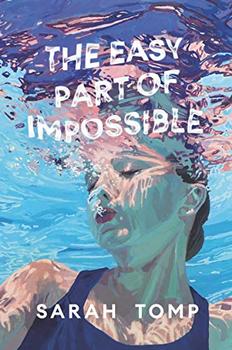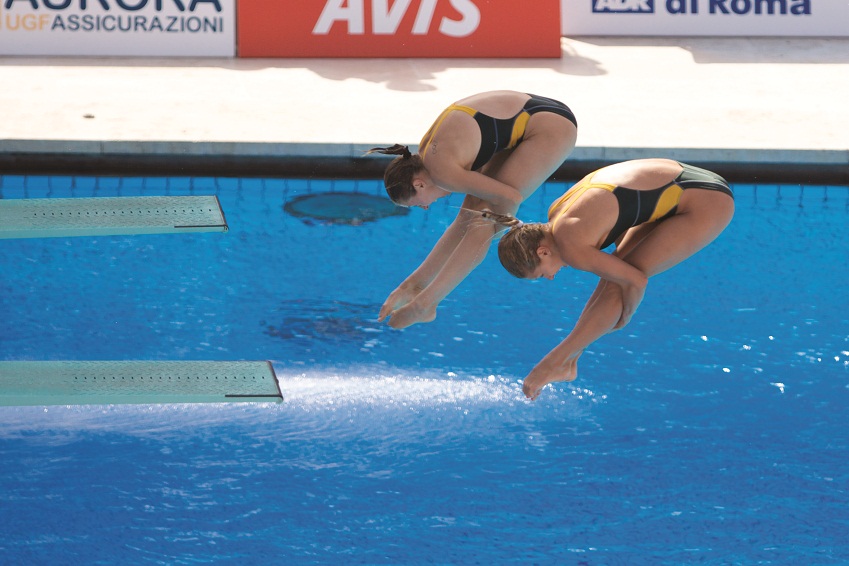Summary | Excerpt | Reviews | Beyond the Book | Read-Alikes | Genres & Themes | Author Bio

This article relates to The Easy Part of Impossible
 In Sarah Tomp's The Easy Part of Impossible, diving proves to be a vital lifeline for teenager Ria Williams, who lives with attention deficit hyperactivity disorder (ADHD). The intense structure, discipline and exertion called for by the sport allows Ria to channel her excess energy into something positive and helps her to master the social skills she previously found difficult.
In Sarah Tomp's The Easy Part of Impossible, diving proves to be a vital lifeline for teenager Ria Williams, who lives with attention deficit hyperactivity disorder (ADHD). The intense structure, discipline and exertion called for by the sport allows Ria to channel her excess energy into something positive and helps her to master the social skills she previously found difficult.
Tomp is not alone in championing the physical and mental benefits of sports for young people living with ADHD. In fact, research shows that the prevalence of the condition is notably higher among collegiate and professional athletes compared to the general population, suggesting that many people living with ADHD are naturally drawn to sports as a form of release and personal development.
To understand how an active lifestyle can benefit young people with ADHD in particular, it's important to recognize the condition's core symptoms. ADHD generally manifests in bouts of surplus energy that can negatively impact an individual's ability to maintain concentration and complete assigned tasks. This can subsequently lead to irritability and frustration. With that in mind, it's no surprise that children with this disorder often struggle to thrive in a classroom environment, so much so that it's not uncommon for them to fall behind their peers academically. This in turn can cause them to get stuck in a cycle of perceived failure and feelings of inadequacy. Sports provide an alternative means to grow and excel, helping children with ADHD to cultivate skills and gain a sense of worth that the education process often denies them.
Building from this same principle, it has also been suggested that the tangible prizes associated with success in sports (trophies, medals, certificates, etc.) act as positive reinforcement of the value to be gained through hard work. This can empower those who normally struggle to maintain motivation by making clear the direct correlation between effort and reward.
It's no coincidence that Tomp chose diving as the sport that speaks to her heroine. If sustaining concentration for extended periods of time poses the greatest difficulty to those with ADHD, enrolling in a sport that requires short, sharp bursts of focus and commitment instead is an ideal solution. Sports of this kind are significantly better suited to the preferred learning style of a person with this condition, helping them to master the key life skill of self-discipline in a fun, interactive way that feels far removed from the potentially stifling atmosphere of a classroom.
Indeed, young people with ADHD are often tarred with an unfair reputation for being disruptive in class. This is due to their higher than normal energy levels, which can make them restless and prone to acting out as a result of frustration. The physical outlet provided by regular, structured sports activity can help to burn off this excess, bringing their energy levels into alignment with their peers and ensuring they're suitably worn out by the end of the day to get a restful night's sleep (something else they often find difficult). Feeling refreshed and refueled is known to bolster focus and productivity, establishing a much healthier and more sustainable routine that should also aid their studies in the long run.
Experts also recognize that people with ADHD can be more naturally impulsive, increasing the likelihood that they will expose themselves to dangerous situations. Many sports have an inherent element of risk involved, allowing young people with ADHD to safely experience the thrill of an adrenaline rush and to indulge any risk-taking tendencies in a controlled environment.
If sports can be used to manage and perhaps even reduce the impact of ADHD on a child's everyday life, it is a testament to the intrinsic link between our physical and mental well-being, and the importance of considering a holistic approach to self-care.
Competitive divers, courtesy of Sports Destination Management
Filed under Medicine, Science and Tech
![]() This "beyond the book article" relates to The Easy Part of Impossible. It originally ran in May 2020 and has been updated for the
July 2021 paperback edition.
Go to magazine.
This "beyond the book article" relates to The Easy Part of Impossible. It originally ran in May 2020 and has been updated for the
July 2021 paperback edition.
Go to magazine.




Everywhere I go, I am asked if I think the university stifles writers...
Click Here to find out who said this, as well as discovering other famous literary quotes!
Your guide toexceptional books
BookBrowse seeks out and recommends the best in contemporary fiction and nonfiction—books that not only engage and entertain but also deepen our understanding of ourselves and the world around us.